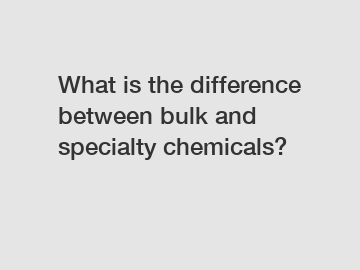Chemicals are an integral part of our daily lives, playing a crucial role in a wide range of industries, from manufacturing to healthcare. When it comes to the chemical industry, two common categories of chemicals are bulk chemicals and specialty chemicals. While both types of chemicals serve important purposes, they have distinct differences that set them apart.
Bulk chemicals, also known as commodity chemicals, are produced in large quantities and are used in high volume by a variety of industries. These chemicals are often relatively simple in composition and are produced through standardized processes for maximum efficiency. Some examples of bulk chemicals include sulfuric acid, sodium hydroxide, and ammonia.
One of the key characteristics of bulk chemicals is their low unit cost. Due to their high production volumes and standardized manufacturing processes, bulk chemicals are typically more affordable compared to specialty chemicals. This makes them ideal for industries that require large quantities of chemicals for their operations, such as the agriculture and construction sectors.

Bulk chemicals also tend to have a wide range of applications across different industries. For example, sulfuric acid is used in the production of fertilizers, batteries, and detergents, while sodium hydroxide is used in the manufacturing of paper, textiles, and soap. The versatility of bulk chemicals makes them indispensable in many industrial processes.
On the other hand, specialty chemicals, also known as fine chemicals, are produced in smaller quantities and are designed for specific applications. These chemicals are characterized by their complex composition and the specialized processes required for their production. Specialty chemicals are often tailored to meet the specific needs of a particular industry or application.
Unlike bulk chemicals, specialty chemicals tend to have a higher unit cost due to their specialized nature and production processes. While they may be more expensive, specialty chemicals offer unique properties and performance characteristics that cannot be replicated by bulk chemicals. This makes them essential for industries that require high-quality and customized chemical solutions, such as pharmaceuticals, electronics, and personal care products.
One of the key advantages of specialty chemicals is their ability to provide innovative solutions to complex challenges. For example, specialty chemicals are used in the development of advanced materials for aerospace applications, specialty coatings for automotive finishes, and customized pharmaceutical compounds for medical treatments. The tailored nature of specialty chemicals allows industries to push the boundaries of innovation and achieve superior results in their products and processes.
Another important distinction between bulk chemicals and specialty chemicals is their production processes. Bulk chemicals are typically manufactured in large-scale chemical plants using continuous processes that are highly automated and efficient. In contrast, specialty chemicals are often produced in smaller-scale facilities using batch processes that require greater attention to detail and quality control.
The production of specialty chemicals also involves a higher level of research and development to create new formulations and improve existing products. This requires a high degree of expertise and technical knowledge, as well as specialized equipment and facilities to ensure the quality and consistency of the final product.
In summary, the key differences between bulk chemicals and specialty chemicals lie in their production volumes, cost, applications, and complexity. Bulk chemicals are produced in large quantities at lower costs for a wide range of industries, while specialty chemicals are manufactured in smaller quantities at higher costs for specific applications that require customized solutions. Both types of chemicals play important roles in the chemical industry, serving different needs and providing valuable contributions to various sectors of the economy.
Want more information on Dephenolized Phenol Oil, phthalic anhydride manufacturer, Dephenolized Phenol Oil? Feel free to contact us.



Comments
Please Join Us to post.
0